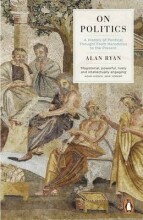Summary: On Politics | 9780140285185 | Alan Ryan
- This + 400k other summaries
- A unique study and practice tool
- Never study anything twice again
- Get the grades you hope for
- 100% sure, 100% understanding
Read the summary and the most important questions on On Politics | 9780140285185 | Alan Ryan
-
2 Plato and Antipolitics
This is a preview. There are 2 more flashcards available for chapter 2
Show more cards here -
What is a demagogue?
A leader who gains support through appealing to the desires of ordinary people rather than rational argument. -
What is sortition/lottery?
A method of choosing public officials in some ancient Greek city-states. It was used especially in Athenian democracy. The basic idea is that nobody is better than anybody else, everybody has an equal right to participate and rule politically. The lottery is the fairest way to rule and provided some political education. -
What are modern challenges to sortition?
1. Inexperienced legislators/magistrates/judges = suboptimal performance
2. Vulnerable to bureaucratic control & outside lobbying/experts
3. Statistical problems: sample sizes would have to increase to be truly representative -
What is value pluralism?
The existence of conflicting and incompatible values. Values which may be equally correct and fundamental, yet are in conflict with each other. -
Plato's view on value pluralism
Thought that the practice of direct democracy revealed the (undesirable) fact of value-pluralism. It is a by-product of diversity and inconstancy of human desires/appetites and lack of regulation of these in a commercial democracy such as Athens. -
Plato's Theory of Human Nature
People are characterised by innate differences. These are largely heritable. The division of labour reflects these differences, and these differences reflect a natural hierarchy. -
What is the True City/City of Pigs?
Based on Plato's account of human nature. It is based on an extensive division of labour (specialisation), with no political or normative consequences. It reflects Socrates' natural hierarchy. Some characteristics:
- Broadly egalitarian
- No luxury/arts (this causes war)
- Monetised economy -
What are the four cardinal virtues?
1. Temperance (workers) --> self-control
2. Courage (auxiliaries)
3. Reason (rulers) --> wisdom
4. Justice (the overarching virtue that governs the whole) -
2.1 The Paradoxical Plato
This is a preview. There are 2 more flashcards available for chapter 2.1
Show more cards here -
What kind of political thought does Plato have?
Antipolitical, utopian -
What are the ideas behind utopian thinkers?
Hope to maintain social order and meet the needs of the population, without economic/political competition and without rulers having to justify their decisions to their peers or to the common people.
- Higher grades + faster learning
- Never study anything twice
- 100% sure, 100% understanding
































